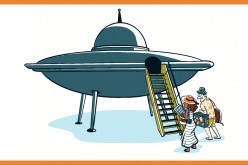Let’s imagine you’re standing in front of two doors. You have two options. Open Door 1 and get an ELECTRIC SHOCK. Or choose the mystery behind Door 2. Door 2 could be better or worse than Door 1, but you won't find out until you open it. What do you choose? Which door would you open? Most folks would open Door 1. That's because most of us would rather have certain pain than gambling with the unknown. And that's true even if we have a 50-50 shot at getting something better, not worse, with Door 2.
Why? Because we crave certainty. We're calmer when we know what to expect — even if it's certain pain — because we can prepare for it. With uncertainty, we're hyper-vigilant to the possibility of pain. We're constantly on edge, waiting for the ball to drop. That's stressful and exhausting up until the moment we get certainty. And that waiting and worrying creates its own pain, no matter
Blog
Welcome to our Blog! At Baron Silver Stevens, we feel it is important to empower our clients with information that can positively affect their lives.
Throughout our Blog, you will find interesting articles, updates on our firm, and practical financial planning tips.
Throughout our Blog, you will find interesting articles, updates on our firm, and practical financial planning tips.
What story do you want to tell about your next vacation? What could make your next trip amazing? The answers could lie in some of the latest trends in travel and those trends aren’t so much focused on exactly where folks are going.
Instead, current travel trends are giving us new ways to enjoy vacations and experience the world — no matter where our trips take us. These trends are also creating exciting new opportunities to make every vacation a memorable, enriching experience.
So, what hot travel trends could make your next vacation better than you ever imagined?
Workcations
Friendcations
GOAT Vacations
Extreme Adventures and Expeditions
Transformational Travel
Showcations
Pet Travel
Find any of those travel trends fascinating? Have you already enjoyed any of them — or will make one part of your next trip? Click here to read more details.
Wherever you’ve been or whatever you’ve done on past
How do you make investment decisions? Do you look at all the data? Search for an interesting opportunity? Surprisingly, most folks don’t look at the facts or data to make these choices. They prefer a good story. Maybe it’s not so surprising. A good story can worm its way into our subconscious faster than any facts can. That’s because research shows good stories appeal to our emotions and our values. They help make sense of the world, and they can be a powerful learning tool at any age.
But that doesn’t always make stories a good foundation for investment decisions. Why? Because the stories we tell ourselves can cloud the facts. And if those stories are rooted in common myths about investing, anyone — even the smartest folks — can have a much harder time making sound investment decisions.
So, what stories could be interfering with your financial choices? What
What's the hardest lesson you've ever had to learn about money? What’s the most powerful one? For many folks, these lessons come from hard-earned experience. They aren’t taught in a classroom. Instead, many folks go to the school of hard knocks. It’s the learn-as-you-go way to understanding personal finance. And those lessons we pick up can shape how we think about and handle money. They can also stick with us for life.
So, what are the money lessons that are never too early to know?
Are there any that you still have to learn? Or get better at? Let’s find out. These essential finance lessons aren’t typically taught in school, but they’re still incredibly valuable to know as early as possible.
And they can take some people a lifetime to learn.
Accountability is key
Pay yourself first
Money isn't the only thing
Want to read the rest? Click here to
What inspires you to give? Most of us give for the same basic reasons. We want to help others, make a positive difference in the world—and giving feels good. It makes us happy, and it connects us to the causes we care about.
Studies show that most charitable folks give according to their values or to support causes they care about. But they don’t always have a strategy around giving. Or a way to monitor for impact.
How do you make the greatest impact with your giving?
If you’re not sure, you’re not alone. Many folks are passionate about giving but don’t have a defined strategy. Even though strategic giving can pave the way for thoughtful donations of money, time, and resources. And that can help you figure out how to do the most good for the causes that matter most to you.
Want to create your own charitable strategy?
What do you really know about finance? How would you rate your financial literacy? Most folks say they're very knowledgeable about financial matters.
But guess what?
Only about 1 in 3 folks can score 80% on a simple financial literacy quiz. And only 7% answer every question right. So, how will you measure up? Can you beat 93% of your fellow Americans?
Click here to take the financial literacy quiz, then come back to this article for some lessons.
How did you do on the quiz? Were you surprised by any of the questions — or answers? It's OK if you couldn't get every question right. You don't have to know everything – few people do. In fact, these days, more folks are missing more questions on this quiz than they did about 10 years ago. And that's not because they're dumb.
Actually, there are a couple of good reasons
Sticker shock at the grocery store? Price hikes at the pumps? Prices are going up and spending more for basics can be startling. Do you remember the first time you noticed prices increasing? It often happens so gradually that we don’t even notice.
Inflation is often more complicated than we realize and it’ll be with us for the rest of our lives. So, what could prices look like in 2030? It will impact:
Housing
Food & Beverage
Healthcare
Gas & Transportation
College
Inflation affects far more than upfront prices. It shakes up the costs of doing business and borrowing money. And it can affect savings, bonds, and plans for the future. We often don’t notice these changes year to year, though. That’s because inflation comes in small doses. A few bucks more here, a couple hundred more there — it creeps up over time. And it’s the reason why inflation
Most of us think about retierment a lot — at least four times a week. We think about when we'll retire and how we'll spend our time in retirement. As exciting as that can be, it can also be nerve-racking to think about trying to fill up all of that free time. And no matter what we dream of, the reality of retirement doesn't always match our expectations.
In fact, nearly half of us miss the mark on when we expect to retire. Most folks who get it wrong end up retiring years earlier than they expected. And that's just one miscalculation. We also tend to underestimate our psychological needs and our options for enjoying our retirement. That can make it more difficult to adjust to retirement. It can also leave us feeling unhappy and dissatisfied with the retired life we worked so hard for.
So, how can we make
What would make your life better? A new house or car? A bigger paycheck or bank account?
It’s easy to want more when you think of being happier and living better and there’s little doubt that money can buy some (more) happiness. But the happiness we get from money is fundamentally limited. It leaves us wanting more, and it’s not enough on its own to enjoy a truly satisfying life.
The reality is a lot of the things that can make us happy and enrich our lives have nothing to do with money.
The following are 7 little upgrades that can make life better in big ways:
Go outside
Say no to things that drain you
Practice gratitude daily
Prioritize self-care
Don't let negativity take over
Volunteer
Nurture your relationships
Living better doesn’t mean we have to make radical changes. And we don’t have to wait for some benchmark or
Innovation promises to alter life in some amazing and drastic ways over the next few decades. Technology is clearly getting more and more integrated into our lives, and that could make some things easier and others more complicated. It may even force us to deal with new, complex issues and challenges we never saw coming.
That may be one reason why about 2 in 3 people aren’t optimistic for the future. And why we can’t help but worry about the uncertainty of it all.
Even though there’s a lot we don’t know, we do know that innovation can make life better.
Things were never the same after some of the biggest inventions of the last few decades — like the internet and smartphones. And we really don’t even think twice about those things today (unless they aren’t working). We also know that technology and time can change our beliefs and














